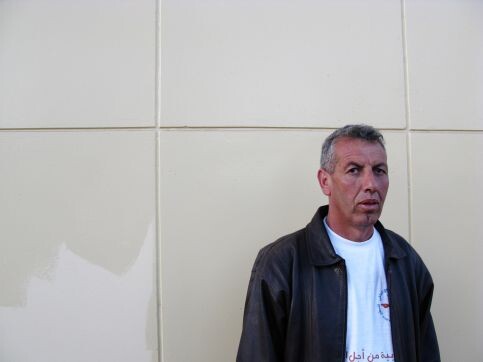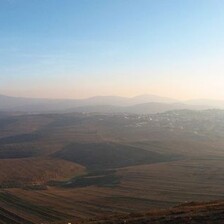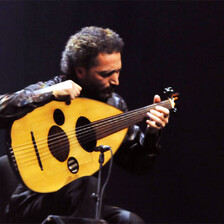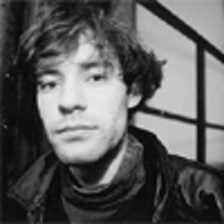The Electronic Intifada 2 March 2011

Ahmad Jaradat in Dakar (Stefan Christoff)
Tens of thousands of activists gathered in Dakar, Senegal for the 2011 World Social Forum (WSF) in February. Hundreds of workshops and assemblies on social justice struggles around the world were held at Cheikh Anta Diop University in Dakar, including a series of presentations on the Palestinian struggle for liberation and the growing global boycott, divestment and sanctions (BDS) movement against Israeli apartheid.
Activists from around the world held meetings, workshops and strategy sessions on the global BDS movement, working toward a global day of action on Palestinian Land Day, 30 March, and a global forum on Palestine to take place in the upcoming years within the WSF process.
Palestinian activist Ahmad Jaradat of the Alternative Information Center (www.alternativenews.org) has been involved in the WSF process over the past decade and sits on the international coordination committee of the global forum. The Electronic Intifada contributor Stefan Christoff spoke with Jaradat outside the Palestine people’s assembly tent in Dakar on the 10th anniversary of the global anti-capitalist gathering.
Stefan Christoff: Can you talk about the importance of the World Social Forum for the global Palestinian solidarity movement?
Ahmad Jaradat: The Palestinian struggle has been a key point for the WSF over the past decade since the first global forum in Porto Alegre, Brazil. As many, many social movements are represented here at the WSF, movements struggling against capitalist globalization, for environmental justice and for human rights, it makes sense that Palestine has been a key point in the forum process.
Only in 2009 at the World Social Forum in Belem, Brazil, after the Israeli military attack on Gaza, did the discussions on Palestine at the WSF move into real action. The international coordination committee of the WSF took a decision to officially support an international day of action in solidarity with Palestine on 30 March — Palestinian Land Day. The first global day of action for the BDS movement, protests took place in many cities all around the world.
In Dakar this year people at the WSF continued to discuss seriously the BDS movement, trying to work out ways to move the BDS campaign forward in the Middle East, in Europe, in North America and also in Africa, even here in Dakar. So now the WSF has become a important space for the global Palestine movement to work on real actions and campaigns in solidarity with Palestinians living under Israeli occupation and military siege which violates our basic rights every day.
SC: Can you describe the sessions on BDS that took place during the forum?
AJ: More than two hundred people attended the BDS session on the opening day of the Palestine people’s assembly at the WSF, with many activists from Palestine, from Europe and from Canada, those leading the BDS campaign in different countries. Reports were presented about different BDS efforts globally, the campaign against Agrexco in France, a presentation by union activists in Morocco struggling against normalization with Israel, to the cultural boycott work in Canada.
Also at this session many Senegalese students attended who were really, really interested in learning about what is happening in Palestine. Hundreds of students from the university stayed for more than two hours listening, learning about BDS and the situation on the ground in Palestine. Now there is a committee established at the Cheikh Anta Diop University to work on BDS and Israeli Apartheid Week. It is so important that the BDS movement develops in Senegal and across Africa.
SC: Can you reflect on your feelings being here at the WSF and organizing for the global Palestine solidarity movement?
AJ: As a Palestinian the global participation at the people’s assembly on Palestine at the WSF makes me proud; the Palestinian issue is now an international issue and is central to this international forum that is working to counter capitalist globalization.
On one side the forces of oppression and corporate power are global but we are responding at a grassroots level globally, on Palestine but also on environmental issues and for human rights all around the world. Protests in Egypt and Tunisia are on everyone’s minds at the WSF and many activists from Tunisia travelled to the forum in Dakar to speak about the situation in their country directly.
Today, Palestinians are in the fire, we are living under occupation, “peace process” negotiations are not achieving anything, the Israeli colonies are expanding, the apartheid wall is being built, East Jerusalem is being colonized, the rights and freedoms of Palestinians living in ‘48 areas [inside Israel] are being attacked, so as civil society globally we have to respond.
Governments are silent toward Israeli human rights abuses but people are responding at a grassroots level all around the world and are having an impact. Today, the BDS campaign is making the Israeli government scared. Similar to decades ago for the South African freedom struggle against apartheid, the BDS campaign has the possibility to become extremely destabilizing for the Israeli apartheid regime and today it is the most important tool for social movements to act in solidarity with Palestine.
BDS is not just about words, it is about action; the campaign is really starting to have an impact and the WSF process is strengthening the BDS movement.
SC: A proposal emerged from the World Education Forum in Palestine in October 2010 for a thematic World Social Forum on Palestine to take place in the coming years. Can you comment on the proposal, which is being discussed and debated here in Dakar?
AJ: Yes, this proposal for a World Social Forum on Palestine is important and I hope that this global forum will play a role is pushing the situation facing the Palestinian people to the international level and lead people to take action globally.
All over the world people today are more and more aware about the situation in Palestine, especially those in social movements, so a global forum will be a way for progressive movements globally to take action, work together and to support and build the BDS campaign.
A global forum on Palestine will be a big achievement and is a statement on the growing number of friends that Palestine has around the world. After the WSF in Dakar, all the groups attending from Palestine will being holding consultations in occupied Palestine toward this global forum and in the next months we can start working on this global event for Palestine.
SC: The Palestinian Authority is facing a great deal of pressure because it has negotiated away fundamental rights of the Palestinian people, like the right of return. However, you represent another major element of the Palestinian political landscape: the grassroots element. Can you speak about this growing split between the Palestinian political class and the grassroots in Palestine?
AJ: From the beginning, [the Oslo accords] worked to divide the Palestinian people; real justice for Palestine is very far from the Oslo agreement. Now the PA is in crisis because the negotiations have failed and the Palestine Papers [diplomatic documents leaked by Al Jazeera] show this clearly. Israeli settlements are expanding, Israeli violations of Palestinian human rights are becoming worse, Gaza is under siege, while the PA is negotiating away our rights. This “peace process” is achieving nothing.
As activists from Palestine we engage with the WSF because we know that this is a long term struggle and grassroots campaigns like BDS can apply real pressure on Israel. Oslo only creates divisions and leads to no concrete changes for the Palestinian people, while the BDS [movement] is creating a real problem for the Israeli government.
Over the past decade through the WSF we have connected with grassroots activists, human rights workers and trade unions globally who are willing to stand with Palestine, so the WSF is important for the global movement for justice and specifically for Palestine. In the past couple WSF forums the words in solidarity with Palestine have moved into action through the BDS campaign and this year we are starting seriously to plan a global forum for Palestine, a major step forward.
Stefan Christoff is a Montreal-based community organizer, journalist and musician who contributes to the Electronic Intifada and works with Tadamon! Follow him on twitter at: www.twitter.com/spirodon.




